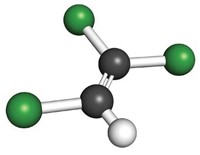Advertisement
Grab your lab coat. Let's get started
Welcome!
Welcome!
Create an account below to get 6 C&EN articles per month, receive newsletters and more - all free.
It seems this is your first time logging in online. Please enter the following information to continue.
As an ACS member you automatically get access to this site. All we need is few more details to create your reading experience.
Not you? Sign in with a different account.
Not you? Sign in with a different account.
ERROR 1
ERROR 1
ERROR 2
ERROR 2
ERROR 2
ERROR 2
ERROR 2
Password and Confirm password must match.
If you have an ACS member number, please enter it here so we can link this account to your membership. (optional)
ERROR 2
ACS values your privacy. By submitting your information, you are gaining access to C&EN and subscribing to our weekly newsletter. We use the information you provide to make your reading experience better, and we will never sell your data to third party members.
Environment
Trichloroethylene Called A Known Carcinogen
by Britt E. Erickson
July 14, 2014
| A version of this story appeared in
Volume 92, Issue 28
Trichloroethylene (TCE), a solvent primarily used as a degreaser for metals, should be reclassified as a known human carcinogen, a draft report from the National Toxicology Program says. This conclusion is based on human epidemiology and toxicology studies that show TCE causes kidney cancer in humans. The draft finds limited evidence that the chemical causes non-Hodgkin’s lymphoma in humans and substantial evidence that it causes several types of cancer in laboratory animals. TCE was listed in 2000 in the federal Report on Carcinogens as a reasonably anticipated human carcinogen. Since then, several studies have linked the chemical to cancer in humans, and the International Agency for Research on Cancer and EPA concluded that TCE is a human carcinogen. The National Toxicology Program evaluated the chemical for possible reclassification in the Report on Carcinogens because of evidence that a significant number of U.S. residents are being exposed to it. TCE was formerly used as a solvent in numerous industries but is now mostly used as a degreaser, an intermediate for hydrofluorocarbon production, and as a modifier in the polymerization of polyvinyl chloride. Last month EPA determined TCE poses a risk to workers and consumers.





Join the conversation
Contact the reporter
Submit a Letter to the Editor for publication
Engage with us on Twitter